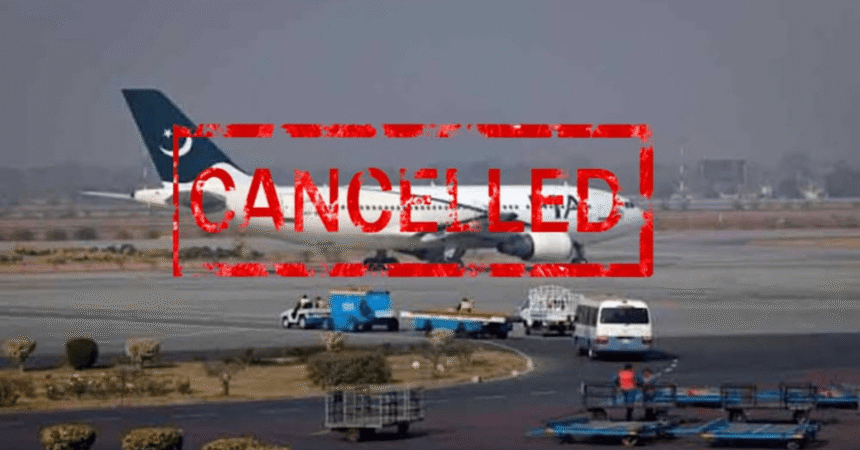On Wednesday, Karachi’s Jinnah International Airport faced significant disruptions as multiple flights were cancelled due to technical and operational issues. This situation has raised concerns among travelers and the broader community about the reliability of air travel in Pakistan, particularly at one of the country’s busiest airports. The cancellations were reported by 24NewsHD TV and have drawn attention to the challenges faced by airlines and airport authorities in maintaining smooth operations.
Overview of Cancellations
The cancellations primarily affected domestic flights, leaving passengers scrambling for alternative travel options. Among the notable flights that were called off were:
- AirBlue Flight PA-807: This flight was scheduled to travel from Karachi to Multan, a popular route for business and personal travel.
- SereneAir: Several flights operated by SereneAir were also cancelled, including:
- ER-524 and ER-522: Both flights were headed to Lahore, a major destination known for its vibrant culture and commerce.
- ER-504 and ER-502: These flights were meant for Islamabad, the capital city, which often sees a high volume of travelers for both business and government purposes.
- ER-554: This flight to Peshawar was also affected, disrupting plans for many passengers heading to the northwest region of Pakistan.
Additionally, Pakistan International Airlines (PIA) saw its flights impacted, with PK-368 scheduled for Islamabad and PK-155 for Sui being called off. These disruptions not only inconvenience travelers but also highlight the ongoing challenges faced by the aviation sector in Pakistan.
Understanding the Causes of Cancellations
The reasons behind these cancellations were cited as technical and operational issues. Understanding these causes can provide insight into the complexities of airline operations.
- Technical Issues: Airlines often face unexpected mechanical failures that require immediate attention. This can involve anything from engine problems to malfunctions in navigational systems. While airlines strive to maintain their fleets in optimal condition, unforeseen issues can arise, leading to flight cancellations.
- Operational Challenges: These can include staffing shortages, scheduling conflicts, or logistical problems at the airport. For instance, if an aircraft is delayed at one destination due to weather or technical issues, it can create a domino effect, impacting subsequent flights scheduled for that aircraft.
- Safety Protocols: The aviation industry is governed by strict safety regulations. If any concerns arise regarding the safety of a flight, airlines are mandated to cancel or delay the flight until the issues are resolved. This commitment to safety, while essential, can lead to significant disruptions for passengers.
- Weather Conditions: Although not explicitly mentioned in this instance, adverse weather conditions can also play a role in flight cancellations. Karachi, located along the coast, is susceptible to sudden changes in weather, particularly during the monsoon season, which can affect flight schedules.
The Impact on Passengers
For passengers, flight cancellations can be incredibly frustrating. Many travelers depend on timely flights for business meetings, family events, and other important commitments. The sudden cancellation of a flight can lead to a range of consequences, including:
- Inconvenience: Passengers may have to wait for hours or even days to secure a new flight, leading to missed connections and important engagements.
- Financial Loss: Non-refundable tickets, hotel reservations, and other travel-related expenses can accumulate quickly, resulting in financial strain for those affected.
- Emotional Stress: The uncertainty and hassle of dealing with travel disruptions can lead to significant stress. Passengers may feel anxious about rescheduling their plans or worry about the implications of missing important events.
Airlines’ Response to Cancellations
In light of the cancellations, airlines typically work to address the situation as quickly and efficiently as possible. The standard responses can include:
- Communication: Airlines are expected to communicate promptly with passengers regarding cancellations and alternative arrangements. This often includes notifications via text messages, emails, and announcements at the airport.
- Rebooking: Airlines usually offer rebooking options for affected passengers, allowing them to choose an alternative flight at no additional cost. However, availability can be a challenge, particularly on popular routes.
- Refunds: For passengers who prefer not to travel or cannot find suitable rebooking options, airlines may offer refunds or credits for future travel, although the process can sometimes be complicated.
- Support Services: Many airlines provide customer service representatives at the airport to assist stranded passengers. This support can be crucial in helping travelers navigate their options and find solutions quickly.
The Role of Airport Authorities
Jinnah International Airport, as the primary airport serving Karachi, plays a crucial role in managing flight operations and ensuring passenger safety. When disruptions occur, the airport authorities must coordinate with airlines and other stakeholders to address the challenges. Their responsibilities include:
- Monitoring Operations: Airport authorities continuously monitor flight schedules and operational status to ensure smooth airport functioning. They must react promptly to disruptions and communicate with airlines to understand the situation.
- Passenger Assistance: In times of disruption, airport staff are responsible for assisting affected passengers, including providing information about alternative travel arrangements, accommodations, and other resources.
- Logistics Management: Managing the logistics of incoming and outgoing flights is critical. The airport must efficiently allocate gates and facilities to accommodate any changes in flight schedules due to cancellations.
Broader Implications for the Aviation Industry
The flight cancellations at Jinnah International Airport underscore broader challenges facing the aviation industry in Pakistan. While air travel remains a vital mode of transportation for many, the sector has faced numerous hurdles in recent years, including:
- Infrastructure Issues: Many airports in Pakistan, including Jinnah International, are grappling with aging infrastructure that may not adequately support the growing demands of air travel. Investments in modernization and expansion are necessary to enhance operational efficiency.
- Economic Factors: Economic instability can impact the aviation sector, as fluctuations in fuel prices and currency exchange rates affect operational costs. Airlines may find it challenging to maintain profitability while delivering reliable services.
- Regulatory Environment: The regulatory framework governing the aviation industry plays a critical role in operational efficacy. Streamlined regulations that support efficient operations and safety compliance are essential for the sector’s growth.
Future Outlook
In light of the recent disruptions, the future of air travel at Karachi’s Jinnah International Airport and throughout Pakistan will depend on several factors. Key considerations include:
- Investments in Infrastructure: To accommodate increasing passenger volumes and improve operational reliability, significant investments in airport infrastructure and facilities will be crucial. Upgrading technology, enhancing terminal facilities, and improving runway capacity can all contribute to smoother operations.
- Adoption of Technology: The integration of advanced technologies can enhance efficiency and reduce operational disruptions. For instance, predictive maintenance tools can help airlines identify potential technical issues before they lead to flight cancellations.
- Improved Communication Channels: Enhancing communication between airlines, airport authorities, and passengers is essential. Real-time updates and effective customer service can mitigate the frustration experienced during cancellations.
- Regulatory Support: A supportive regulatory environment that encourages operational efficiency and safety will be vital for the aviation sector’s recovery and growth. Policymakers must work collaboratively with airlines and airport authorities to address challenges and foster a sustainable aviation industry.
The flight cancellations at Karachi’s Jinnah International Airport highlight the complexities and challenges faced by the aviation industry. While the immediate impacts are felt by passengers, the broader implications extend to airlines, airport authorities, and the overall health of the aviation sector in Pakistan. By addressing operational issues, investing in infrastructure, and fostering effective communication, stakeholders can work towards enhancing the reliability and efficiency of air travel, ensuring that such disruptions become less frequent in the future.
As the aviation industry evolves, maintaining passenger trust and satisfaction will be paramount. The hope is that through concerted efforts, the challenges faced today can lead to a stronger and more resilient aviation sector in the years to come.
#KarachiAirport #FlightCancellations #PakistanAviation #JinnahInternationalAirport #TravelDisruptions







